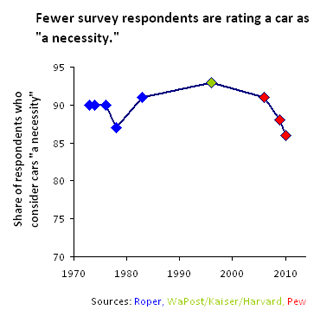Do you think of cars as a “necessity?” If so, you’re not alone. In the most recent Pew “luxury vs. necessity” survey, 86 percent of Americans said that their automobile was indispensable.
That’s an awful lot of people. In fact, cars are rated as more “necessary” than pretty much any other consumer good that Pew considered.
And yet, as the chart to the right shows, 86 percent is also the lowest rate since the question was first asked, in 1973. And on the flip side, Pew finds that more people than ever consider the car to be simply a “luxury.” (This pdf has the complete data series.)
Although I think it’s probably a bad idea to read too much into these trends, it’s also risky to ignore them.
On the one hand, just about everything rates as less “necessary” now than it did in 2006, when the economy was riding high. In fact, the perception that cars are necessary fell a lot less than for most other old-school consumer goods, like microwaves and air conditioners. Compared to the TV, the car’s status as a perceived “necessity” keeps barreling along on cruise control.
On the other hand, we may be seeing the effects of generational changes in attitudes towards the car. Despite the still-shaky economy, a few high-tech goods — cell phones, high-speed internet — have become more “necessary” since 2006, particularly among young people. But some of the items that have been hardest hit, including TVs and land-line phones, are dropping like a stone — mostly because of generational shifts. (Young people increasingly prefer cell phones to land lines, and the internet to TV.)
Meanwhile, there’s other evidence that younger people are driving a lot less than they used to. The Pew study doesn’t break down the trends by age group. But given the other data out there on generational shifts in attitudes towards driving, I wouldn’t be surprised if the drop-off in the perceived “necessity” of cars has been particularly steep among younger folks. (Then again, with unemployment rates as high as they are among younger folks, it may be little surprise that cars don’t seem particularly “necessary.”)
Of course, it’s perfectly fair to interpret the Pew results as showing that cars are still seen as one of the most “necessary” of modern conveniences. The only thing that was close was the washing machine (though Pew stopped asking that question in 2006). Given how slowly the car trends are moving, most Americans will continue to view the automobile as an essential for quite some time.
But as we’re trying to figure out what kinds of public investments to make for the future, the rise in the perceived “necessity” of high-tech products and fast internet connections, coupled with the decline in the “necessity” of cars, may offer some hints about which way the wind is blowing.


Comments are closed.